英语语法句子大全
英语语法大全-英语句子八大成分

英语句子成分主语主语:主语表明这句话说的是谁和什么,主语主要由名词、代词或相当于名词的单词,短语或从句充当。
My English teacher is very nice.■名词作主语英语是很重要的。
这本书很有用。
■代词作主语他们乘公共汽车上学。
大多数学生来自农村。
■动名词作主语(动名词、动词不定式作主语时通常用 it 作形式主语)看电视太多对你的眼睛是有害的。
Smoking is not good for your health.吸烟对健康有害。
It's a waste of time doing this. 这样做是浪费时间的。
■不定式作主语(动名词、动词不定式作主语时通常用 it 作形式主语)眼见为实。
It is very important to study and work hard. 努力学习和工作非常重要■从句作主语What he said was very interesting. 他说的很有意思。
That he is coming is good news. 他回来真是个好消息。
谓语谓语:谓语(predicate verb)是对主语动作或状态的陈述或说明,指出“做什么”、“是什么”或“怎么样”。
谓语动词的位置一般在主语之后。
谓语由动词构成,依据其在句中繁简程度可把谓语分为简单谓语和复合谓语两类。
不论何种时态、语态、语气,凡由一个动词(或动词词组)构成的谓语都是简单谓语。
复合谓语可分为两种情况:第一种是由情态动词,助动词+不带to的动词不定式构成的复合谓语:What does this word mean?I won't do it again.第二种是由连系动词+表语构成的复合谓语。
例如:The weather gets warmer, and the days get longer.Keep quiet and listen to me.He looked worried.■及物动词作谓语让我来帮助你。
英语语法句子
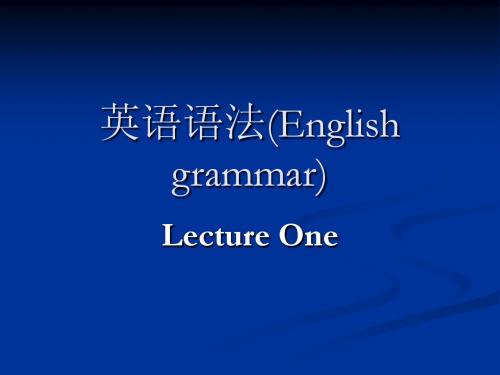
I have no ticket to spare. (不定短定)我没有多余的票。 The train has three sleeping cars. (动名定)这辆火车有三节卧铺车厢。 The sleeping baby is his son. (现分定)那个熟睡的婴儿是他的儿子。 This is a story about Lei Feng. (介短定)这是一个关于雷锋的故事。 He is a returned student. (过分定)他是一个归国留学生。 Do you know the man who made the report? (定从)你认识那个做报告的人吗?
定语:修饰名词和代词的成分。用形、名、数、副、形短、 名短、不定短、现分短、过分短、介短、定从等表示(举 例) He is a brave man. (形定)他是一个勇敢的人。 They are chemistry teachers. (名定)他们是化学老师。 There are seven or eight books on the desk. (数定)桌上有7、8本书。 The man downstairs is Professor Smith. (副定)楼下那个人是史密斯教授。
I smell something burning. (现分宾补)我问到什么东西烧起来了。 They made him the chairman. (名宾补)他们选他当主席。 He painted the door blue. (形宾补)他把门漆成蓝色了。 He took these words as evidence. (介短宾补)他把这些话当作证据。 Bring him in. (副宾补)把他带进来。
初中英语语法大全:英语的五个基本句型

初中英语语法大全:英语的五个基本句型1简单句、并列句、复合句根据语法形式,即句子的结构,英语的句子可分为简单句、并列句和复合句。
1简单句句型:主语+谓语只包含一个主谓结构,而句子的各个结构都只由单词或短语表示。
简单句有五种基本句型,详见第十七章。
They are playing baseball in the garden.他们正在公园里打棒球。
Her brother and sister both are teachers.她的哥哥和姐姐都是老师。
2并列句句型:简单句+并列连词+简单句(常见的并列连词有and,but,or)并列句是由两个或两个以上的简单句连接而成。
并列句中的各简单句意义同等重要,相互之间没有从属关系,是平行并列的关系。
它们之间用连词连结。
My friend was at home, and we talked for along time.我的朋友在家,我们谈了好长时间。
Her father is a doctor and her mother is a teacher.她父亲是个医生,她母亲是个老师。
I liked the story very much but Li Ming wasn't interested in it.我非常喜欢这个故事,可是李明却对它不感兴趣。
Hurry up,or you'll be late.快点,否则你就会迟到的。
3 复合句句型:主句+连词+从句;或连词+从句+主句(包含一个主句、一个或一个以上的从句,或只包含一个从句,但有两个或两个以上的主句的句子叫复合句。
)句子的成分组成句子的各个部分叫做句子的成分。
句子成分包括:主语、谓语、表语、宾语(直接宾语、间接宾语)、宾语补足语、定语和状语。
主语和谓语是句子主体部分(在英文中一般的句子必须有主语和谓语)。
表语、宾语和宾语补足语是谓语里的组成部分。
其他成分如定语和状语是句子的次要部分。
英语作文万能语法和句子
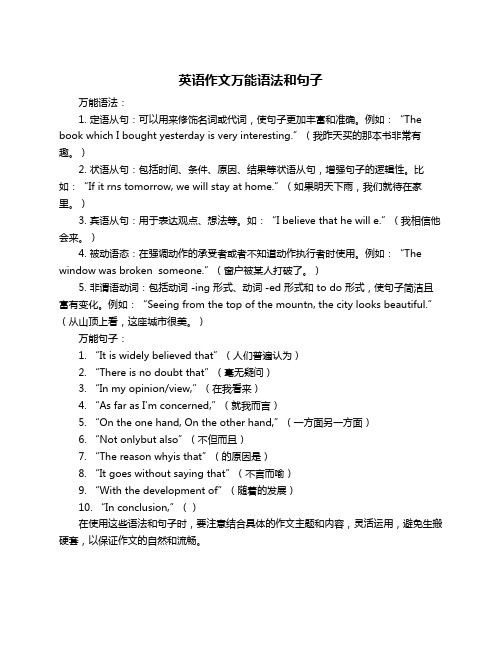
英语作文万能语法和句子万能语法:1. 定语从句:可以用来修饰名词或代词,使句子更加丰富和准确。
例如:“The book which I bought yesterday is very interesting.”(我昨天买的那本书非常有趣。
)2. 状语从句:包括时间、条件、原因、结果等状语从句,增强句子的逻辑性。
比如:“If it rns tomorrow, we will stay at home.”(如果明天下雨,我们就待在家里。
)3. 宾语从句:用于表达观点、想法等。
如:“I believe that he will e.”(我相信他会来。
)4. 被动语态:在强调动作的承受者或者不知道动作执行者时使用。
例如:“The window was broken someone.”(窗户被某人打破了。
)5. 非谓语动词:包括动词 -ing 形式、动词 -ed 形式和 to do 形式,使句子简洁且富有变化。
例如:“Seeing from the top of the mountn, the city looks beautiful.”(从山顶上看,这座城市很美。
)万能句子:1. “It is widely believed that”(人们普遍认为)2. “There is no doubt that”(毫无疑问)3. “In my opinion/view,”(在我看来)4. “As far as I'm concerned,”(就我而言)5. “On the one hand, On the other hand,”(一方面另一方面)6. “Not onlybut also”(不但而且)7. “The reason whyis that”(的原因是)8. “It goes without saying that”(不言而喻)9. “With the development of”(随着的发展)10. “In conclusion,”()在使用这些语法和句子时,要注意结合具体的作文主题和内容,灵活运用,避免生搬硬套,以保证作文的自然和流畅。
英语语法基础知识句子种类及练习
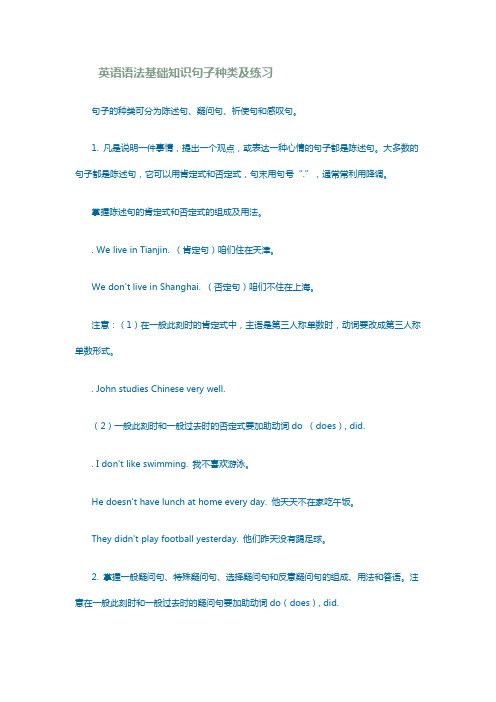
英语语法基础知识句子种类及练习句子的种类可分为陈述句、疑问句、祈使句和感叹句。
1. 凡是说明一件事情,提出一个观点,或表达一种心情的句子都是陈述句。
大多数的句子都是陈述句,它可以用肯定式和否定式,句末用句号“.”,通常常利用降调。
掌握陈述句的肯定式和否定式的组成及用法。
. We live in Tianjin. (肯定句)咱们住在天津。
We don't live in Shanghai. (否定句)咱们不住在上海。
注意:(1)在一般此刻时的肯定式中,主语是第三人称单数时,动词要改成第三人称单数形式。
. John studies Chinese very well.(2)一般此刻时和一般过去时的否定式要加助动词do (does), did.. I don't like swimming. 我不喜欢游泳。
He doesn't have lunch at home every day. 他天天不在家吃午饭。
They didn't play football yesterday. 他们昨天没有踢足球。
2. 掌握一般疑问句、特殊疑问句、选择疑问句和反意疑问句的组成、用法和答语。
注意在一般此刻时和一般过去时的疑问句要加助动词do(does), did.. Do you often speak English at school ? 在学校你常讲英语吗?Does she have a brother ? = Has she got a brother ? 她有兄弟吗?Did it take you two hours to do your homework last night ?昨天晚上做作业花了你2个小时吗?What do you often do on Sundays ?礼拜日你常常干什么?When does your father get up every morning ?你父亲天天早晨几点钟起床?Why didn't your teacher come to school yesterday ?昨天你们的老师为何没来学校呢?提出两种或两种以上的情况,要求对方选择一种,这种疑问句叫选择疑问句。
100个句子搞定英语语法
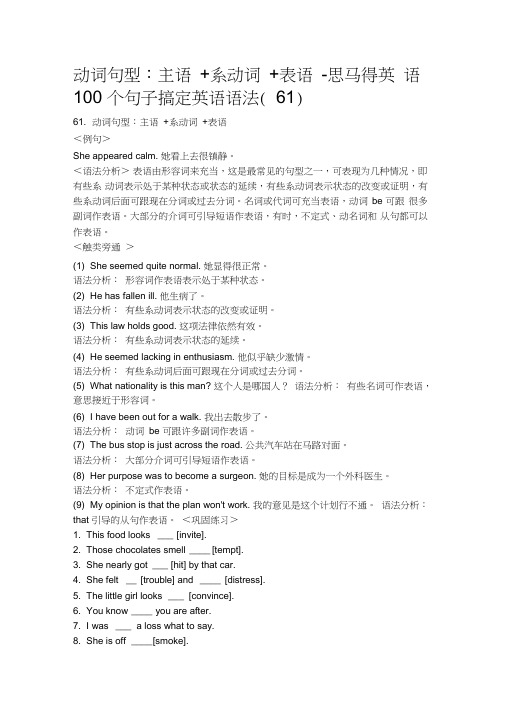
动词句型:主语+系动词+表语-思马得英语100 个句子搞定英语语法( 61)61. 动词句型:主语+系动词+表语<例句>She appeared calm. 她看上去很镇静。
<语法分析>表语由形容词来充当,这是最常见的句型之一,可表现为几种情况,即有些系动词表示处于某种状态或状态的延续,有些系动词表示状态的改变或证明,有些系动词后面可跟现在分词或过去分词。
名词或代词可充当表语,动词be 可跟很多副词作表语。
大部分的介词可引导短语作表语,有时,不定式、动名词和从句都可以作表语。
<触类旁通>(1) She seemed quite normal. 她显得很正常。
语法分析:形容词作表语表示处于某种状态。
(2) He has fallen ill. 他生病了。
语法分析:有些系动词表示状态的改变或证明。
(3) This law holds good. 这项法律依然有效。
语法分析:有些系动词表示状态的延续。
(4) He seemed lacking in enthusiasm. 他似乎缺少激情。
语法分析:有些系动词后面可跟现在分词或过去分词。
(5) What nationality is this man? 这个人是哪国人?语法分析:有些名词可作表语,意思接近于形容词。
(6) I have been out for a walk. 我出去散步了。
语法分析:动词be 可跟许多副词作表语。
(7) The bus stop is just across the road. 公共汽车站在马路对面。
语法分析:大部分介词可引导短语作表语。
(8) Her purpose was to become a surgeon. 她的目标是成为一个外科医生。
语法分析:不定式作表语。
(9) My opinion is that the plan won't work. 我的意见是这个计划行不通。
语法分析:that 引导的从句作表语。
英语语法25个代表性句子

Verb Pattern 1: subject+verb+direct object1.He cut his fingers.2.We have already had breakfast.3.He does not like cold weather.4.We always do that.5.I want six.6.We lit a fire.7.They were throwing stones.8.A baby cannot dress itself.9.He laughed a merry laugh.10.She smiled her thanks.11.I dug a hole.Verb Pattern 2: Subject+Verb+(not) to- infinitive etc.1.He wants to go.2.I have promised to help them.3.They decided not to go.4.Did you remember to shut the windows?5.He agreed to pay for it.6.Have you (got) to go to school today?7.Would you care to go for a walk?8.He pretended not to see me.Verb Pattern 3: Subject+Verb+noun or pronoun+(not) to—infinitive etc.1.He wants me to be early.2.I asked him not to do it.3.I told the sevant to open the window.4.Please help me (to) carry this box.5.He likes his wife to dress well.6.Your teacher expects you to work hard.7.I warned him not to be late.8.He allowed the soldiers to take him prisoner.9.They have never known him to behave so badly.Verb Pattern 4: subject+verb+noun or pronoun + (to be) + complement1.They believed him (to be) innocent.2.Do you consider her (to be) honest?3.I consider it (to be) a shame.4.Tom’s teacher thinks him (to be) the cleverest boy in the class.5.We proved him (to be) wrong.Verb Pattern 5: Subject+Verb+Noun or Pronoun+Infinitive etc.1.I made him do it.2.Let me go!3.We must not let the matter rest here.4.They have never known him behave so badly.5.I will have him do the work.6.Will you help me carry this box?7.Would you have me believe that?8.I heard him come in.9.We saw them go out.10.T hey felt the house shake.11.W atch me do it.12.D id anyone notice the thief leave the house.Verb Pattern 6: subject+verb+noun or pronoun+Present Participle1.He kept me waiting.2.I found him working at his desk.3.They left me standing outside.4.I heard him giving orders.5.We watched the train leaving the station.6.Do you feel the house shaking?7.Can you smell something burning?8.I saw him running off.Verb Pattern 7: subject+verb+object+adjective1.Don’t get your clothes dirty.2.The sun keeps us warm.3.Get yourself ready.4.Don’t make yourself uneasy.5.I found the box empty.6.We painted the door green.7.They set the prisoners free.8.Can you push the door open?9.The cold weather turned the leaves red.10.H e wished himself dead.Verb Pattern 8: subject+verb+object+noun1.They elected him king.2.The people crowned Richard king.3.They chose Mr Smith chairman.4.We call the dog “Spot”.5.They named their son Henry.6.They made Newton President of the Royal Society.7.They called them cowards.Verb Pattern 9: subject+verb+object+Past Participle1.You must get your hair cut.2.Where did you have them printed?3.She had a new dress made.4.Have you ever heard Italian spoken?5.His actions made him respected.6.King Charles I had his head cut off.7.The solider had two horses shot under him.Verb Pattern 10: subject+verb+object+adverb, adverb phrase etc.1.Put it here.2.He took his coat off.3.He has given it away.4.Mr Smith showed me to the door.5.We employed her as a cook.6.They treat their sisiter as if she were only a servant.7.He brought his brother to see me.8.He took the medicine in order to get well.9.They led me to believe that there was no danger.10.I don’t know her to speak to.Verb Pattern 11: subject+verb+(that) clause1.I hope (that) you will come.2.I suppose (that) you will be there.3.He explained that nothing could be done.4.Do you think (that) it will rain?5.He saw (that) the plan was useless.6.I suggested (that) he should leave early.Verb Pattern 12: subject+verb+noun or pronoun+(that) clause1.I told the man (that) he was mistaken.2.I warned you (that) he would be late.3.We satisfied ourselves that the plan would work.4.Please remind him that he must be here early.Verb Pattern 13: subject+verb+conjunctive+to+infinitive etc.1.I wonder how to do it.2.I do not know what to do.3.He is learning how to swim.4.She was wondering which to buy.5.Will you find out how to get there?6.You must remember when to begin.7.I do not know whether to go or stay.Verb Pattern 14:subject+verb+noun or pronoun+conjunctive+to+infinitive etc.1.We showed him how to do it.2.Please tell me which to take.3.Can you advise me which to buy?4.The patterns show you how to make sentences.5.Tell me whether to come or not.6.They told him when to start.7.Tell her what to do.Verb Pattern 15: subject+verb+conjunctive+clause1.I wonder why he has not come.2.I wonder whether (if) he will come.3.I do not mind where we go.4.Do you know who he is?5.I do not care what you think.6.Can you suggest where this ought to go?7.Please say what you want.8.Nobody knows whose it is.Verb Pattern 16: subject+verb+noun or pronoun+conjunctive+clause1.Tell me what it is.2.Ask him where he put it.3.They asked us when we should be back.4.Can you tell me how high it is?5.Can you inform me when the train leaves?6.Please advise me whether these seeds should be sown now.Verb Pattern17:Group A: subject+verb+gerund etc.1.Please stop talking.2.He enjoys playing tennis.3.I remember doing it.4.Please excuse my being so late.5.Do you mind staying a little longer?6.Do you mind my staying a little longer?7.She could not help laughing.8.He keeps on coming here.9.They went on talking.10.h as it left off raining yet?Group B: subject+verb+gerund etc.1.He began talking. (=to talk)2.He likes swimming. (=to swim)3.I prefer staying (=to stay) indoors on cold winter evenings.4.I hate refusing (=to refuse) every time.5.He started packing (=to pack) his books and clothes.Group C: subject+verb+gerund(=passive voice)1.It wants doing. (=to be done)2.Your work needs correcting. (=to be corrected)3.That needs explaining. (=to be explained)Verb Pattern 18Group A: subject+verb+direct object+prep.+prepositional object1.I gave the money to my friend.2.They told the news to everybody they met.3.We showed the pictures to our teachers.4.I don’t lend my books to anybody.5.He offered one to me.6.I owe ten pounds to my tailor.7.Throw that book to me.8.Bring that book to me.Group B: subject+verb+direct object+prep. +prepositional object1.he bought a gold watch for his wife.2.Please save some for me.3.She made a new dress for herself.4.Have you left any for your sister?5.Please get two tickets for me.Group C: subject+verb+direct object+prep.+prepositional object1.Thank you for your kind help.2.Ask him for some more.pare this with that.4.They punished him for being late.5.Congratulate him on his success.6.Don’t throw stones at the dog.7.What prevented you from coming?8.Add this to what you already have.9.I explained my difficulty to him.10.P rotect us from the enemy.Verb Pattern 19:Group A: subject+verb+indirect object+direct object1.Have they paid you the money?2.Will you lend me five dollars?3.Our teacher gave us an English lesson.4.I read him the letter.5.Please throw me that book.6.His mother told him a story.7.He handed me the book.8.The pupils wished their teacher ‘Good morning’.9.He denies her nothing.Group B: subject+verb+indirect object+direct object1.She made herself a cup of tea.2.Her father bought her a new dress.3.Buy me one.4.Did you leave me any?5.She ordered herself a new dress.6.Will you do me a favour?7.Cam you spare me one?8.Can you get me a copy of that book?Group C:subject+verb+first object+second object1.I envy you your fine garden.2.Forgive us our sins.3.That will save a me a great deal of trouble.4.I struck him a heavy blow.5.He asked me a question.Verb Pattern 20: subject+verb+(for) complement1.We walked (for) five miles.2.They had come a long way.3.The forests stretched (for) miles and miles.4.The rain lasted all day.5.He may live (for) many years yet.6.We waited (for) two hours.7.It weighs five tons.8.The thermometer went up ten degrees.9.It costs ten dollars.10.W ill you stay (for) the night?Verb Pattern 21: subject+verb1.Fire burns.2.Birds fly.3.We all breathe, eat and drink.4.The moon rose.5.The sun was shining.Verb Pattern 22: subject+verb+predicative1.This is a book.2.This book is mine.3.That will be plenty.4.Please get ready to start.5.The weather has become warmer.6.The leaves have turned red.7.It feels soft.8.The plan proved useless. (of no use)9.The results are what we expected.10.H is dreams came true.Verb Pattern 23: subject+verb+adverbial adjunct1.Stand up!2.We must turn back.3.The sun rises in the east.4.We did not go anywhere.5.He will come as soon as he is ready.6.A chair will not stand on two legs.Verb Pattern 24: subject+verb+prep.+prepositional object1.He called on me.2.It depends on the weather.3.He succeeded in solving the problem.4.Look at the blackboard.5.He believes in getting up early.6.I should not think of doing such a thing.7.I rely on your discretion.8.I rely on you to be discreet.9.I will arrange for transport.10.I will arrange for a car to meet you at the station.Verb Pattern 25: subject+verb+to+infinitiveGroup A:1.We stopped to have a rest.2.I am waiting to hear your opinion.3.I come to bury Caesar, not to praise him.Group B:1.He lived to be 90.2.How do you come to know that?3.How can I get to know her?Group C:1.He awoke to find the house on fire.2.The good old days have gone never to return.3.She trembled to think of it.Group D:1.They seemed not to notice it.2.Do you happen to know where he is?3.I chanced to meet him in the park.Group E:1.We are to be married in May.2.Am I to stand here for ever?3.Nobody is to know.4.This I was only to learn later.…taken from The Advanced Learner’s Dictionary of Current English (Oxford)。
含有语法知识的英语句子
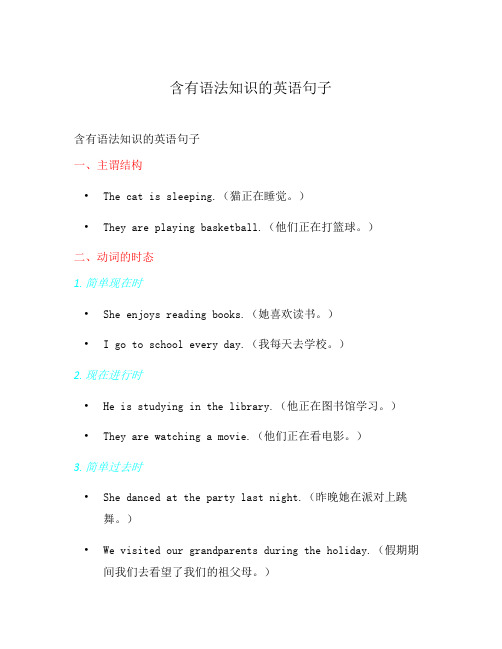
含有语法知识的英语句子含有语法知识的英语句子一、主谓结构•The cat is sleeping.(猫正在睡觉。
)•They are playing basketball.(他们正在打篮球。
)二、动词的时态1. 简单现在时•She enjoys reading books.(她喜欢读书。
)•I go to school every day.(我每天去学校。
)2. 现在进行时•He is studying in the library.(他正在图书馆学习。
)•They are watching a movie.(他们正在看电影。
)3. 简单过去时•She danced at the party last night.(昨晚她在派对上跳舞。
)•We visited our grandparents during the holiday.(假期期间我们去看望了我们的祖父母。
)4. 过去进行时•They were playing soccer when it started raining.(下雨时他们正在踢足球。
)•I was studying when the phone rang.(电话响的时候我正在学习。
)5. 将来时•I will meet you at the airport tomorrow.(明天我会在机场见你。
)•They are going to have a party next week.(他们下周要开个派对。
)三、名词的单复数•The book is on the table.(书在桌子上。
)•There are many students in the classroom.(教室里有很多学生。
)四、形容词和副词•She is a beautiful girl.(她是一个漂亮的女孩。
)•He runs quickly.(他跑得快。
)五、代词的用法•I like this dress.(我喜欢这件裙子。
- 1、下载文档前请自行甄别文档内容的完整性,平台不提供额外的编辑、内容补充、找答案等附加服务。
- 2、"仅部分预览"的文档,不可在线预览部分如存在完整性等问题,可反馈申请退款(可完整预览的文档不适用该条件!)。
- 3、如文档侵犯您的权益,请联系客服反馈,我们会尽快为您处理(人工客服工作时间:9:00-18:30)。
英语语法句子大全篇一:书面上句子的种类句子的种类英语句子按照其交际功能可人际交往分为陈述句、疑问句、祈使句和感叹句四类。
1. 陈述句用于描述一项事实的句子叫叙述陈述句(declarative sentence)。
陈述句可以是肯定句也可以是否定句。
例如:My advice to you is to speak the truth. 我建议你说真话。
Your answer is not quite correct. 你的回答不太正确性。
2. 疑问句用来提出疑问的句子叫疑问句(interrogative sentence)。
疑问句有四类:一般疑问句、特殊疑问句、选择疑问句和反意疑问句。
1) 一般疑问句用yes 或no 来回答的疑问句,叫一般疑问句(general question)。
句中的助动词或情态动词要放在主语之前,形成倒装词序。
在个别情况下,如表示猜测、惊讶、怀疑时,也可使用陈述语序。
例如: Do you find it difficult to learn a new language?你认为学习一种新的语言难吗?Will she accept the invitation? 她会接受邀请吗?2) 特殊疑问句用疑问词开头,就某一具体反问部分提问的疑问句,称为特殊疑问句(special question)。
片语引出特殊句型的疑问词有who(谁),whom(谁),whose(谁的),which(哪个),what(什么),where (哪里),when(何时),why(为什么),how(如何)等。
例如:Who will come tomorrow?明天谁会来? What are you doing there? 你在那儿干什么? When did they get married? 他们是什么时候结婚的?Where did you find the book? 你在哪里辨认出的这本书?3)选择疑问句说话人提供两种或者两种以上的情况供对方做出的疑问句,叫选择疑问句(alternative question)。
(1) 选择助动词通常是由or连接的助词两个一般疑问句构成的。
当or后面的部分与前面的部分句法相同时,常用省略结构。
例如:Shall I give you a hand or can you manage? 需要我帮忙还是你自己来?Did you come by bus or by bike? 你是坐公交车来的还是骑车来的。
(2) 疑问句也可在特殊疑问句的基础上构成,即前一部分是特殊疑问句,后面是款型的并列部分。
例如:Which coat do you like, this one or that one?你喜欢哪件上衣,这一件件还是那一件件? Which do you prefer, coffee or tea? 你喜欢喝什么,咖啡还是茶? 4)反意疑问句在陈述句之后附加一个简短问句,对陈述句所叙述的事实提出疑问的句子叫反意疑问句(disjunctive question)。
反意疑问句通常表示说话人对自己的看法不完全肯定,希望对方加以证实。
(1) 在反意疑问句中,如果前一部分是肯定的陈述句,后一部分要用反驳否定形式的简短陈述句;如果前一部分是否定的陈述句,其后一部分则用肯定形式的简短问句。
两部分在人称、数、时态方面均要大致相同。
回答时要用yes或no。
例如:—The workers have breakfast at seven in the morning, don’t they?工人们早晨7点吃早餐,是吗?—Yes, they do. 是的,他们7点吃早餐。
—There are many people in the club, aren’t there? 俱乐部里有很多人分,是不是?—Yes,there are. 是的,有很多人。
(2) 在回答反意疑问句时,不管其陈述陈述部分是肯定的还是批驳的,只要答语是肯定的,就要用Yes,否则就用No。
例如:—The old man is a professor, isn’t he? 那位老人是教授,是不是?—Yes, he is. 是的,他是教授。
—No, he isn’t. 不,他不是。
—The old man is not a professor, is he? 有位老人不是教授,对吗?—No, he isn’t. 对,他不是教授。
— Yes, he is. 不,他是。
3. 祈使句表示请求、命令、建议、邀请、劝告等的句子叫祈使句(imperative sentence)。
祈使句通常暗含第二人称主语,但不表示出来,谓语动词一律用原形。
为了使祈使句听起来婉转、客气,可以在句首或句尾加please。
这类祈使句的否定式是在句首加Don’t。
例如:Please pass me the dictionary. 请把字典递给我。
Don’t take the book away. 不要把书拿走。
另一类祈使句是以let开头的,由“l et me / us +动词原形”构成。
其否定形式是“let me / us not + 动词原形”。
注意let’s 与let us 用法上的区别:用let’s引起的祈使句,意思既包括说话者所在的一方,也包括对方,即建议大家共同去互相合作做某件事;用let us引起的祈使句,往往只建议由说话者所在的一方去做某件事,不包括对方。
例如:Let me drive the car. 让我来开车。
Let us not do that. 我们别做那件事。
Let’s not waste our t ime arguing about it.咱们别浪费时间争论这件事了。
还有一类祈使句由“let + 第三人称+动词原形”构成。
其否定形式是在句首加Don’t。
例如:Let him start early. 让他早点出发。
Don’t let the children make noise. 不该让孩子们吵闹。
4. 感叹句表示喜、怒、哀、乐等强烈感情的句子叫感叹句(exclamatory sentence)。
常见的感叹句由what或how引起,what修饰名词,how修饰形容词、副词。
例如:How hard he works! 他教育工作多么努力呀!How happy we are to see you today! 今天见到你我们真非常高兴呀!What an interesting book she has! 她的那本书明明有趣啊!What a pity it is to lose the game again! 这场比赛又输了,真可惜!简单句、并列句、复合句英语句子按照其结构可分为简单句、并列句和复合句。
1. 简单句只有一个主语(或并列主语)和一个谓语动词(或并列谓语)的句子称为简单句 (simple sentence)。
例如:Successful learners are learners with a purpose.学得好的人都有明确的学习目的。
He stopped the car and waited for the red light to change to green. 等到他停下车来耐心等待红灯变绿灯。
2. 并列句两个或两个以上的简单句用并列连词(或用分号“;”、冒号“:”、逗号“,”等)连在一起构成的句子叫并列句(compound sentence)。
常用的并列连词有:and, so, not only…but also, neither…nor, or, either…or, but, yet, stil l, however, while, for 等。
例如:Hurry up or you may be late for the meeting. 快点,否则你开会就要迟到。
He is well over sixty, but he does not look at all old.他已年过花甲,但毫不显老。
Here the water is quiet, for there is little wind. 这里水面平静,因为几乎没有风。
Some people waste food while others have notenough. 有些人浪费食物,有些人不够吃。
I gave him all he asked for, yet he was still not satisfied. 他要什么我给他什么,但他仍不满足。
I have just had some good news: I’ve been offered a jobin a law firm. 我刚得到好消息:我已在一家律师事务所找到了工作。
The moon went down; the stars grew pale; thecold day broke; the sun rose. 月亮西下;星光暗淡;寒夜破晓;旭日东升。
3. 复合句包含两个或两个以上的主谓结构,其中一个是主要的,其余是从属的,这一类句子称为复合句(complex sentence)。
主要的主谓结构称为主句,从属的称为从句。
从句由关联词引导,关联词将从句和主句联系在一起。
根据其在复合句中的指导作用,从句可分为主语从句、宾语从句、表语从句、同位语从句、定语从句和定冠词从句等。
例如:We move our heads from side to side when we want to say “no.” 我们想说“不”的时候,就左右摇头。
(关联词when引导状语从句)The purpose of a test is to show what you havelearned about a subject. 考试的是为了了解你掌握某一门课程的情况。
(关联词what 引导宾语从句)Most adults who are learning a foreign language would disagree with the statement. 多数允诺正学习外语的成年人不会同意这种说法。
(关联词who引导定语从句)The reason for their success is that they can learnfrom their mistakes. 他们成功的原因在于能够从自己的错误中学习。
(关联词that引导表语从句)Who will chair the meeting is of interest to many of them. 他们中的很多人对谁主持会议很感兴趣。
(关联词who引导主语从句)篇二:英语语法大全整理英语语法大全关于词类和句子成分根据词的形式、意义及其在句中的功用将词分为若干类,叫做词类。
